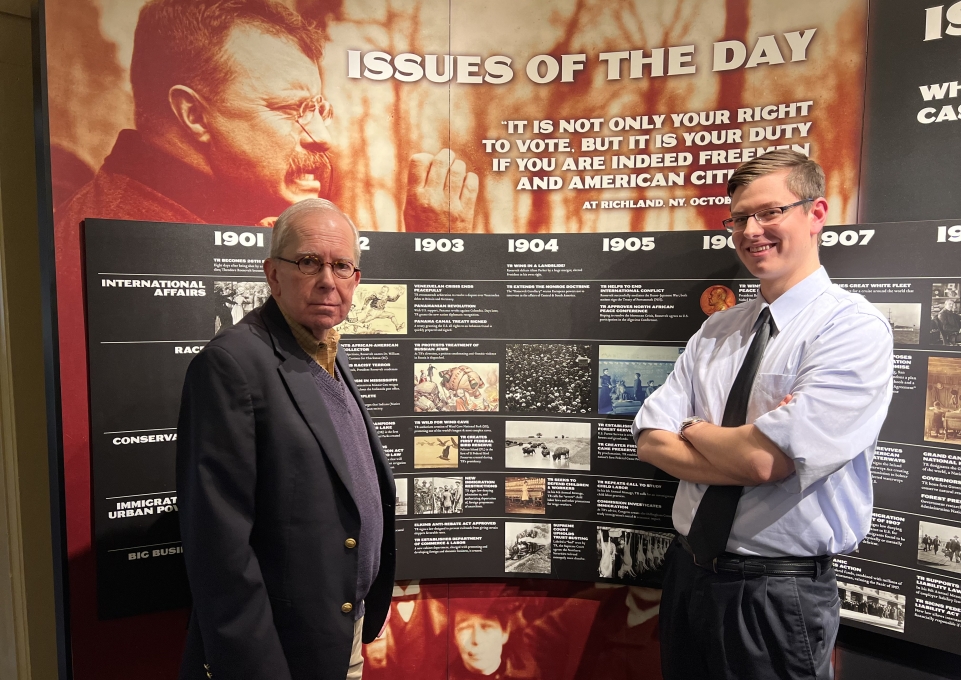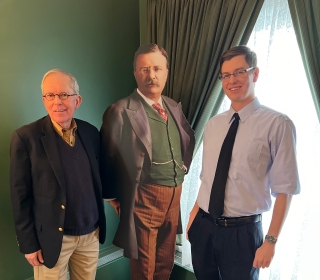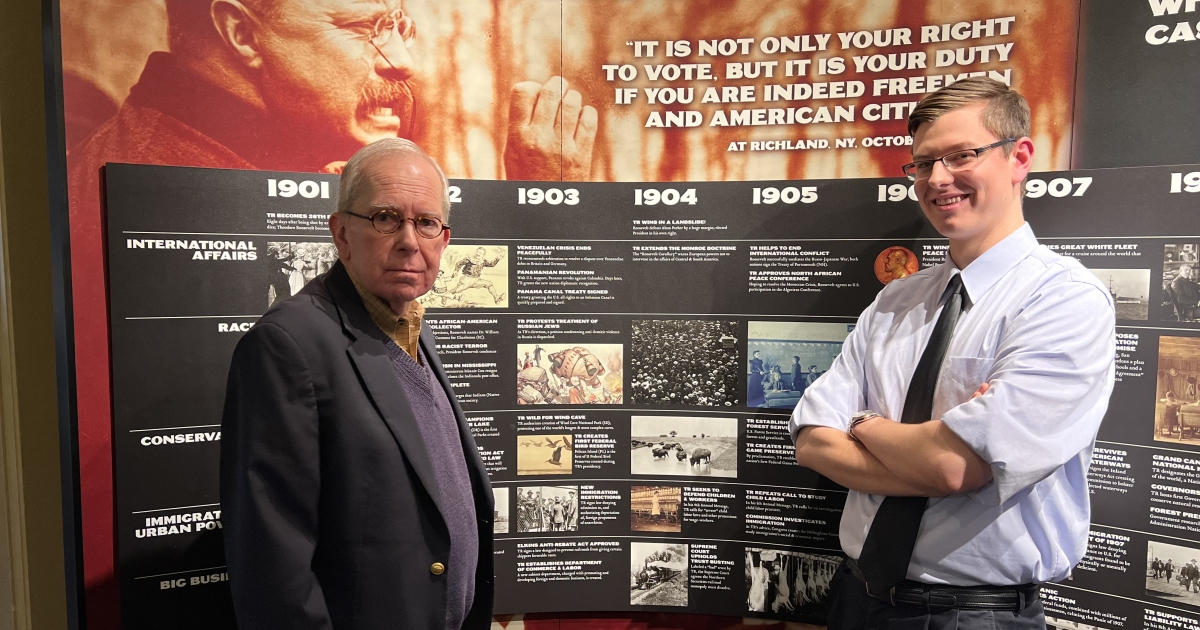
Jacob Riedel, a graduate student in Buffalo State University’s social studies education program, became the first recipient of the Hudders Family Theodore Roosevelt (TR) Inaugural National Historic Site Masters Fellowship in spring 2023.
The fellowship, established in 2019 through a donation from the Hudders family, is open to students in the history and social studies education programs who have completed 9 credit hours of graduate study at Buffalo State with a minimum cumulative grade point average of 3.5. Applications are reviewed by members of the History and Social Studies Education Department and TR Inaugural Site staff. Upon the fellowship’s conclusion at the end of the fall 2023 semester, Riedel received academic credit and a $2,500 stipend; he will be recognized as the inaugural fellow at the 2024 History and Social Studies Education Department Awards Ceremony on April 25.
This past fall, Riedel worked to connect students and educators with the TR Inaugural Site. His fellowship goal was to create meaningful educational resources to both serve the community and allow educators to use the site as a teaching tool.
“All educators should strive to connect local historic sites with the curriculum, because school is a part of your community,” Riedel said. “You have to connect students with what’s beyond the classroom.”
“We let Jacob get a feel for what we do and how we do it, then let him decide what he thought would be most important,” said Stanton Hudson, Buffalo State lecturer of communication, who served as executive director of the TR Inaugural Site until his retirement last month. “He’s in a classroom already and knows what students need—perhaps better than we do.”
Riedel’s focus has been the creation of four unique inquiry design models (IDMs), large lesson plans that educators can apply over multiple days. Riedel chose IDMs for their efficiency, effectiveness, and ability to engage students, which he said he’d seen demonstrated in his graduate courses.
“You start with the question—a really compelling question,” Riedel said. “Then it’s the educator’s job to keep supplementing that curiosity with the students as they gather information to answer it.”
Riedel’s IDMs, designed for 11th- and 12th-graders, focus on issues faced by Theodore Roosevelt during his presidency: big business, immigration, labor, poverty, and racial and gender equality. Two IDMs have already been completed; Riedel, who is continuing his work with the TR Site in the spring 2024 semester through a separate contract for an additional graduate course, expects to complete the remaining two by semester’s end.
“Jacob really created this program himself and worked to put these studies together,” Hudson said. “These are lesson plans teachers will actually use.”
IDM completion is marked by student application of acquired information through a community-connected project such as a poster, presentation, letter, or other representation of learning. Riedel said it’s possible one of the rooms at the Inaugural Site will display the student work.
“Once done and available on the TR Site’s website, an educator is free to adapt each inquiry to their own classroom,” said Riedel, who explained that IDMs provide recommendations, rather than requirements. “It’s really accessible.”

Stanton Hudson (left), former executive director of the TR Inaugural Site, and Buffalo State graduate student Jacob Riedel.
Accessibility is key, Riedel noted, especially for schools outside the area. “The TR Site has been implementing technology to help connect schools that are farther away,” he said. “We are working with a local company that’s going to transfer the content of the IDMs into a digital and accessible medium—virtual, tour-like experiences—that can be shared with schools across the state.”
Riedel, who completed his undergraduate degree at SUNY Geneseo, hoped for this kind of opportunity when he chose to pursue a master’s degree at Buffalo State.
“In graduate study, especially social studies education, the goal is to interact with the actual social studies and histories of where you are,” he said. “[At Buffalo State], you are always learning something new, and there is no shortage of opportunities. You engage with new things and have ample opportunity to apply yourself. I’m very appreciative of this opportunity.”
“This fellowship provides a wonderful opportunity for students in our two programs to build upon their content and professional training in conjunction with one of our region’s most important historical destinations,” said Andrew Nicholls, professor and chair of the History and Social Studies Education Department.
Hudson added, “When we had this opportunity from a donor to fund a fellowship, we went to Buffalo State to make it happen. This is the result of five years of working to find just the right student who could take what we have done here at the site and translate that into something that can be used in classrooms, not only here in Western New York but throughout New York State.”
Riedel emphasized the importance of an accessible approach to history and social studies education. “It’s not a question of ‘Why does history matter?’; it’s ‘How does it impact you?’” Riedel said. “We need more educators to talk about history from an issues standpoint. These are problems that students have to deal with. As social studies teachers, it’s our job to prepare them, give them the skills to think critically, handle a situation, and engage with their community. That’s way more important than remembering random dates.”
Video and photos by Ken Giangreco, John Myers, and Dave Ross, Buffalo State Marketing and Communications.



